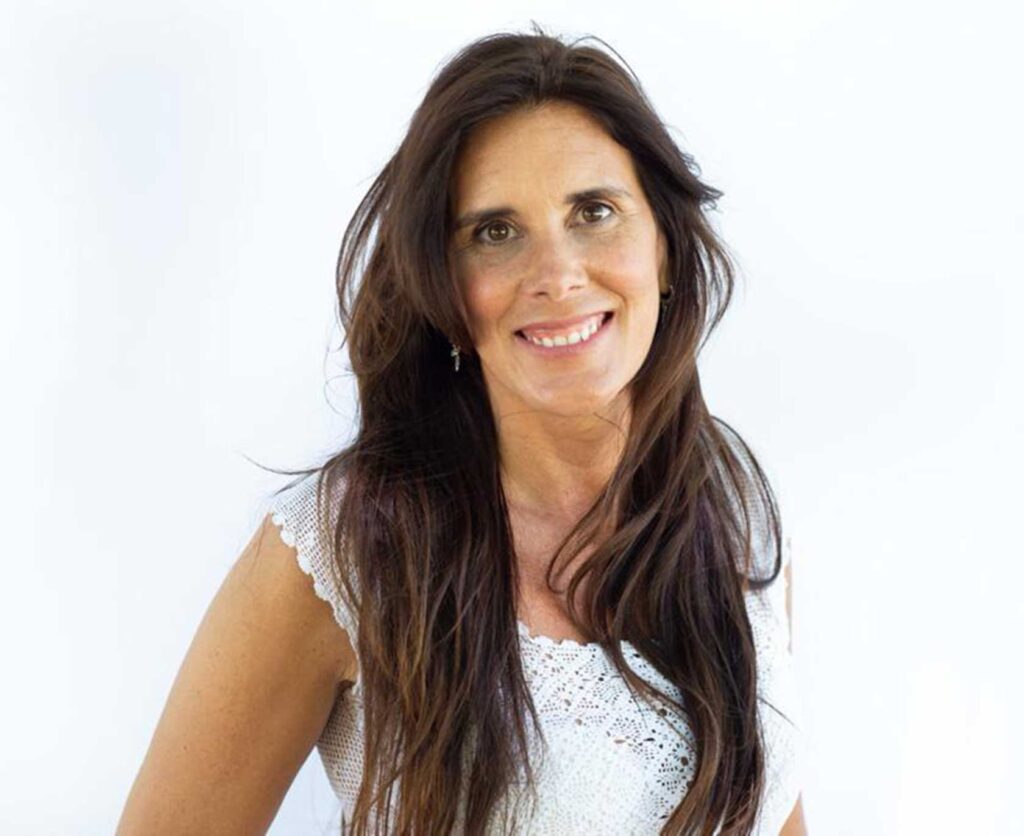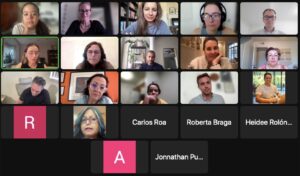For Spanish speakers, a non profit media outlet is looking to address disinformation ahead of election

For Latino communities, sharing information on the instant messaging platform WhatsApp can fall under a philosophy of “comparto por las dudas” — share it just in case — said Laura Zommer.
It’s a mindset that she and her Spanish-language media nonprofit Factchequeado are looking to change.
“Every time that we leave a gap of information, we leave space for bad actors to jump in and spread disinformation,” said Zommer, the organization’s co-founder and CEO.
Launched in 2022, Factchequeado is focused on creating content in Spanish to combat mis- and disinformation in the United States, as well as promoting media literacy among the community it serves — including pushing for a move away from sharing any tidbit of information “just in case.”
“What we are trying to do is to say, ‘OK, let’s share feelings, let’s share opinions,’ but when we are in front of facts, when we are in front of information, and it’s sensitive information related to election, information related to health information, related to migration procedures, [and we don’t know if it’s true,] don’t share it,” said Zommer. Previously, she led Argentina-based Chequeado, the first fact-checking organization in the Global South, and founded LatamChequea, a regional fact-checking network in Latin America.
Zommer said that the work is especially important in the run-up to November’s presidential election. To head off gaps in information around the election, the Factchequeado team is creating what they are calling Electobot, a WhatsApp chatbot that can provide factual information about the election in a conversational style.

Representatives from Spanish language media outlets and community organizations join leaders from media nonprofit Factchequeado at a “cafecito” coffee hour to discuss community needs. As an organization, Factchequeado is focused on limiting disinformation for Spanish speaking communities in the United States.
Next month, the group is launching Electopedia, an election-focused platform with articles and videos in both Spanish and English to cover basic information around an election as well as content addressing prominent points of election-related disinformation the group has seen in past elections in the U.S. and Latin American countries.
Factchequeado isn’t running a partisan effort, but instead is focused on making sure all eligible voters feel equipped to make a decision on how they want to vote.
“We are never going to ask people to vote for Harris or to vote for Trump, but what we are trying to do is say, ‘OK, we want to help you to have all the tools that you need to decide what you want,’” Zommer said. “Obviously, you can also decide not to go to vote, but we want to give the chance not to feel that you don’t have enough knowledge to understand even the smallest detail of the system to make your own decision.”
A big piece of the work Factchequeado handles is meeting communities where they are, which includes focusing communication less in traditional media forms and more in platform like WhatsApp, which are widely used in Spanish-speaking communities.
A 2022 report from New York University found that Latino residents in the United States were almost four times as likely to use WhatsApp compared to their non-Latino counterparts. Platforms like TikTok are also more frequently used by Latino communities, the report found.
As a result, Factchequeado has puts out much of their content through WhatsApp, and allows readers to ask them questions about topics or conversations that need to be fact-checked. If the group already has a resource on the topic, they can send an answer immediately, otherwise their newsroom might look into the topic and share the information out.
“We communicate a lot in WhatsApp, because WhatsApp is free. WhatsApp has allowed people that don’t necessarily have lots of resources to continue being in touch with families and friends,” Zommer said.
The group’s goal also includes supporting local Spanish news outlets by partnering with them and other nonprofits to identify what issues and topics their communities need more information on, as well as providing information and content to organizations that are often small and operating with limited staff.
“Lots of the media covering or producing content in Spanish in the U.S. are small teams,” Zommer said. “In lots of cases, they are just one or two reporters, or the founder and two or three reporters. In some cases, you can find a super big newsroom with 10 or 12 [staff], but that is not the most usual.”
Locally, the group partners with the Boston-based El Planeta, a Spanish-language newspaper.
The work aims to fill a gap that Zommer and her co-founder Clara Jiménez Cruz — who also serves as CEO and editorial director of Maldita.es, a similar anti-misinformation effort in Spain — saw in 2019 and after the start of the COVID-19 pandemic.
Zommer said both she and Jiménez Cruz saw a lot of mis- and disinformation reaching their countries that was originating in the United States and — even after the country grappled with communicating accurate information about COVID-19 and its vaccinations and treatments — they identified few organizations that had been able to spin up any widespread effort to make sure information reaching Spanish-speaking communities was accurate.
The groups that did exist were that kind of small organization, often with limited resources, so the pair decided to work to supplement those teams with Factchequeado.
Now, the group has over 100 partners who regularly meet in “cafecitos” or coffee hours, weekly Zoom meetings to discuss what their communities are seeing — especially those the outlets don’t have a chance to address — to help direct where Factchequeado will focus its efforts on.
Zommer said those partners are an important piece of making sure their coverage accurately reflects what Spanish-speaking communities across the country are taking about, helping to set them up to better understand if the news they’re reading is likely to be accurate or not.
“Latinos who speak Spanish and choose to get their news in Spanish need a better offer, need more investment, need more people creating what they need,” Zommer said. “We are contributing in different ways to do that.”






